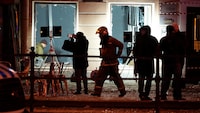Vladlen Tatarsky was one of the Ukraine war’s more prominent military bloggers. His Telegram page has more than half a million followers. According to reports, Tatarsky was an alias, and the writer’s real name was Maksim Fomin.
The Russian Ministry of Foreign Affairs condemned the attack in a statement. The ministry’s spokeswoman, Maria Zakharova, praised Fomin and bloggers like him, who she said are regularly threatened by Ukraine.
Military bloggers are valued for their insight and sourcing in a medium that thrives on live coverage. During Russia’s invasion of Ukraine, even pro-Kremlin bloggers like Fomin criticized the Russian war effort, often arguing for more aggressive policies or different strategies but remaining pro-war.
Fomin is a former fighter with the separatist Donbas militia, The Washington Post has reported. His radical bent was appreciated by the war’s leaders, as evidenced by the access he was given. That includes Yevgeniy Prigozhin, the financier of the infamous Wagner mercenary group and Putin’s former chef. Fomin conducted an interview with Prigozhin this year in which the Wagner boss criticized Russian Defense Minister Sergei Shoigu and Valery Gerasimov, the chief of the general staff, over supply issues Wagner has faced.
“When we will run out of all the Wagner fighters, it’s Shoigu and Gerasimov that will probably have to take up arms,” Prigozhin said in the interview with Fomin. “All Russians should speak out and say: ‘Give ammunition to Wagner.’”
Fomin was certainly no peacenik. A BBC journalist tweeted a video of Fomin from last September following a speech by Russian President Vladimir Putin in the Kremlin. In it, the blogger says: “We’ll conquer everyone, we’ll kill everyone, we’ll loot whoever we need to, and everything will be just as we like it.”
The explosion that killed Fomin is not the first mysterious attack inside Russian territory. Another pro-Russian writer and commentator, Daria Dugina, was killed by a car bomb in August 2022. She was the daughter of far-right ideologue Alexander Dugin.



